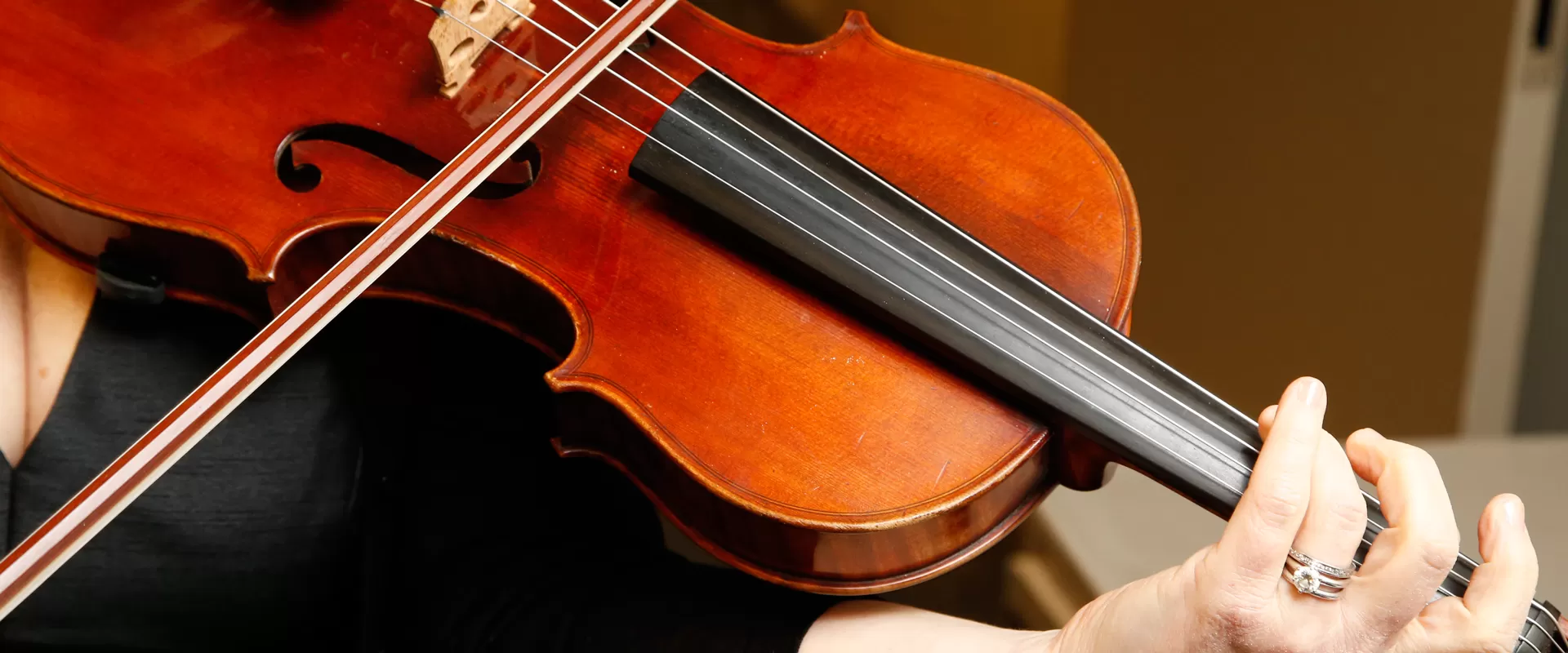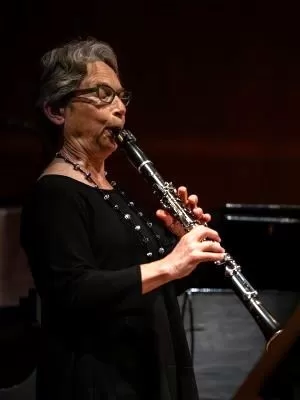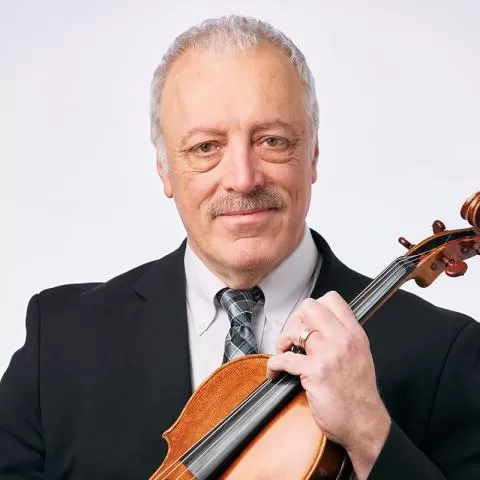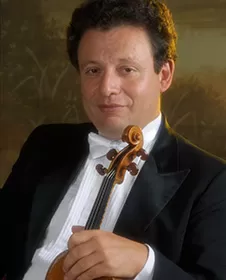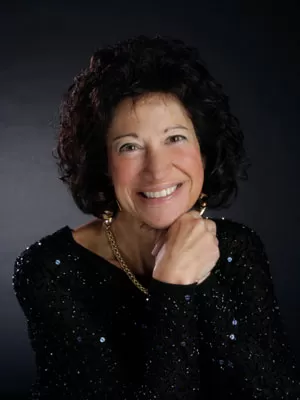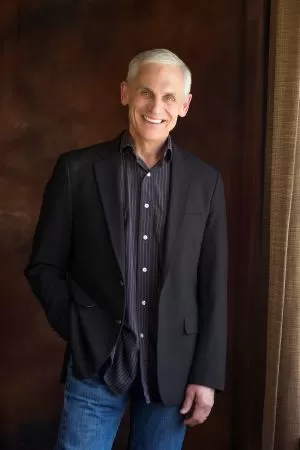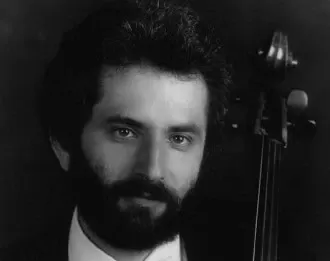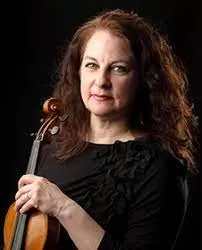Nov 4, 2001 - 12:00 pm
Pre-concert Lecture with Martin Goldsmith
| Prayer (from Te Deum, 1743) In tribute to the victims and survivors of September 11, 2001 |
George Frederic Handel (1685-1759) |
|---|---|
| Leonid Keylin, violin | |
| Lieder, Op. 38 (1947) | Erich Wolfgang Korngold (1897-1957) |
| Julie Mirel, mezzo soprano Mina Miller, piano |
|
| Four Songs (1944, Terezín) To the words of Chinese Poetry |
Pavel Haas (1899-1944, Auschwitz) |
| Erich Parce, baritone Mina Miller, piano |
|
| From the World of My Father (1948) | Herman Berlinski (b. 1910) |
| David Tonkonogui, cello Mina Miller, piano |
|
| Intermission |
|
| The Dreams and Prayers of Isaac the Blind (1994) | Osvaldo Golijov (b. 1960) |
| Laura DeLuca, clarinet Mikhail Shmidt, violin Jeannie Wells Yablonsky, violin Joseph Gottesman, viola David Tonkonogui, cello |
|
Lieder, Op. 38 (1947) - Erich Wolfgang Korngold (1897-1957)
Best known as one of Hollywood's great movie composers, Korngold started his musical career as a celebrated child prodigy in the competitive intellectual world of turn-of-the-20th-century Vienna. Mahler called the boy a genius and sent him off to study with a great teacher, Zemlinsky; by the time Korngold was 13, the prestigious Vienna Court Opera was staging his first ballet, Der Schneemann. As the son of an influential and controversial music critic, Korngold's talents faced intense scrutiny; his father's efforts to influence his career and musical tastes generated jealousy and intrigue. With the premiere of Korngold's opera, Die Tote Stadt, in 1920, Puccini called the 23-year-old "the strongest hope for new German music." Korngold's harmonies reflected the flowering of late Romanticism; the complexities of Richard Strauss, not Arnold Schoenberg, were home to him. Still, his fate was swept into the same cauldron as those of his more radical contemporaries.
With the Nazi rise to power in 1933, Korngold and his wife followed an increasingly large wave of artist-emigrants and headed for Hollywood in 1934: an invitation had come from Max Reinhardt for Erich to compose music for the Warner Brothers film of A Midsummer Night's Dream. Korngold's biographer, Brendan Carroll, calls this move "the death knell of his reputation as a serious composer for the next four decades." (The Last Prodigy: A Biography of Erich Wolfgang Korngold, Portland: Amadeus Press, 1997). His reputation as a popular composer, however, skyrocketed: Korngold was to film music in his day what John Williams is in ours. Korngold's prolific Hollywood output earned him two Oscars, for The Adventures of Robin Hood (1938, with Errol Flynn) and Anthony Adverse (1936, with Olivia de Havilland), and another two Oscar nominations, for The Private Lives of Elizabeth and Essex (1939) and The Sea Hawk (1940).
Despite the political situation, Korngold returned to Vienna in 1937, busying himself with public performances of his chamber music and opera. In January 1938, a telegram arrived from Hollywood requesting that Korngold be there in ten days to write the music for Robin Hood. That telegram, he later would recall, saved his and his family's lives. They were all in America by the end of April; back in Vienna, the family's home was already occupied by German troops. Korngold's publisher, the Josef Weinberger firm, boldly rescued most of the composer's priceless music library, including his earliest manuscripts. The manuscripts were sent across the ocean a page at a time, inserted into newly bound scores of Beethoven, Offenbach, and Richard Strauss.
Opus 38 is a cycle of five songs. Dedicated to Maria Jeritza, creator of two of Korngold's most important operatic roles, Violanta and Marietta, the songs received their premiere performance on the Korngold's first trip back to Europe after the war. Most of the music comes from the film scores: "Glückwunsch" from Devotion (1943), "Der Kranke" from Juarez (1939), and "Alt-Spanisch" from The Sea Hawk (1940). (Howard Koch, the lyricist for "Alt-Spanisch," would later write the screenplay for Casablanca.) The music for "Alt-Spanisch" was actually composed 30 years earlier. When Korngold needed a song for a court scene in the movie, he went to the sketches for his Opus 9, Sechs Einfache Lieder (written between the ages of 9 and 14), and found one he had discarded. Korngold set Shakespeare's wry Sonnet No. 130 as a gift to his eldest son, Ernst, who, according to Carroll, "shared his father's passion for Shakespeare and, recently married and having returned from serving in the US Marines, was now embarking on a teaching career."
Lieder, Op. 38, was composed between 1940 and 1947 and premiered in Vienna, February 19, 1950, by Rosette Anday, mezzo-soprano, and Erich Wolfgang Korngold, piano.
Four Songs (Terezín, 1944) - Pavel Haas (1899-1944, Auschwitz)
To the words of Chinese poetry
These songs exist thanks to the efforts of vocalist Karel Berman, the bass voice for whom they were written. Berman and Haas were fellow prisoners in Terezín, the former Czech fortress converted by the Nazis into a concentration camp to which many artists were sent from all over occupied Europe. A flourishing cultural life at Terezín helped mask the camp's daily horrors of disease, starvation, and regular shipments to the death camps. From the Nazis' point of view, it also provided a cover for any investigators (such as visitors from the Red Cross) to whom they might want to show how well the Jews were doing under their "protection."
Haas composed this song cycle at Berman's request, as the central piece for a recital in the Terezín Town Hall. The texts are from the collection New Songs from Ancient China translated into Czech by B. Mathesius.
When Czechoslovakia was taken by the Nazis in 1941, Haas was interned at Terezín because he was a Jew. With chamber music, an opera, and an unfinished symphony to his credit, Haas was already recognized as an important composer, and considered Janacek's best pupil. The wit and modern instrumentation of Stravinsky were important influences on him.
In this song cycle Haas overtly expresses his hatred of occupation and his dream of freedom. Like Janacek, he makes his point through the use of musical motifs recognizable to his audience: in this case, the St. Wenceslas chorale and folk dances.
The melody of the word "Wenceslas", from the oldest version of the St. Wenceslas chorale, appears at the beginning of the first song, joined to the words, "my home is there." The melody repeats and repeats, disappears during the second song, and returns in the third and fourth. In these last two, underneath the singer's wishful words about a return home and a reunion, the music evokes Moravian folk songs. One can imagine the swelling emotions of the first audience for this song cycle, interned, scared to death, and far from home. Berman survived, and after the liberation of Terezín, brought out Haas's manuscript of these songs.
From the World of My Father - Herman Berlinski (1910-2001)
Suite No. 2 for cello and piano
Composed in 1938, reconstructed in New York (1948) and revised in Washington DC (1969)
When Herman Berlinski died at the age of 91, the Washington Post memorialized him as a "cultural institution" in the city which had been his home since 1963. His final composition, Psalm 130 for solo voice, choir and organ, commissioned by the Washington National Cathedral, was first performed three days after his death, to mark the dedication of a stained-glass window.
This prolific composer of oratorios, organ music, sonatas and songs, was born in Leipzig, the son of Polish immigrants. Berlinski's early contact with the non-Jewish world was limited by his strictly religious family and school, but when he left home, he rejected religion. It was in wartime Paris that his contemporary and friend, Olivier Messiaen, encouraged him to use the Jewish musical language of his childhood in the same way that others of "La Jeune France" worked with Gregorian chant, to create what Berlinski termed a "post-Schoenbergian" sound.
Berlinski had left Germany with his family in March of 1933, three months after the Nazis came to power, and not long after his graduation from the prestigious Leipzig Conservatory with a piano soloist diploma. During those student years, he was among the many young musical talents who created political satire for the Weimar Republic's cabarets. "I wanted to be part of a battle which was tragically lost before it ever was joined," he later wrote. Before crossing the Nazi-controlled German borders, he destroyed his political cabaret songs.
A brief stay in Poland, where he did not speak the language and found crushing misery among his Jewish relatives, convinced Berlinski that he needed to be in Paris to grow as a musician. The trip from Warsaw took months instead of days, because "I had no thought of entering Germany again, even with a Polish passport." Poland left a deep impression on the young musician. "Poland is deep in my bones," he remembered. "It became the world of my father, and my relatives, part of the millions of others who perished in the Holocaust, who live in my emotions and consciousness. They are in my music." The German-born Herman Berlinski entered Paris as a Polish Jew.
In addition to studies with Nadia Boulanger, Berlinski's Paris years, 1933-1941, included work with a Jewish avant-garde theatre. Here he began to use musical ideas gleaned from his fellow refugees - biblical cantillation, Eastern European folk tunes, Hasidic melodies. These ideas became the basis for Suite No. 2.
Berlinski enlisted in the French military in 1939, but with the Nazi occupation of Paris, became a refugee again, losing most of his compositions in the move. The first suite "From the World of My Father," originally written for string quartet and the early electronic instrument called Ondes Martenot, was the sole survivor. The second suite was reconstructed from memory ten years later, in New York.
The United States provided Berlinski with a new start through the Jewish Music Forum of New York, a monthly gathering of performers and composers. Despite his earlier rejection of all things religious, Berlinski discovered in America a world where serious musical work could be done in the Jewish liturgical setting. He began to play and compose for the organ, earned a doctoral degree in sacred music at the Jewish Theological Seminary, and held the positions of organist at New York's Temple Emanuel (1954-1963) and minister of music at the Hebrew Congregation of Washington, DC (1963-1977).
The Dreams and Prayers of Isaac the Blind (1994) - Osvaldo Golijov (b. 1960)
Osvaldo Golijov comes from the generation which grew up in the shadow of the Holocaust. Argentina's Jewish community - current population over 200,000 - swelled, like others in large Latin American cities, when people fleeing Hitler's Europe found refuge there. Golijov grew up in an Eastern European Jewish household in La Plata, a suburb of Buenos Aires, sharing a bedroom as a boy with his great-grandfather. "I think of him always praying, or fixing things, his pockets full of screws," the composer told interviewer Brooke Gladstone in 1996. "I remember thinking, three of his children are dead; how does he still pray? Why does he still fix things? But we were taught that God had assigned that task of repairing the world to the Jewish people - Tikkun Olam. Incomprehensible."
Golijov studied with Gerardo Gandini, a pupil of Alberto Ginastera, and so inherited the new classical music tradition that blended European avant-garde with an Argentinian nationalist idiom. In 1983 he moved to Israel, where he studied with the Ukraine-born musicologist and composer Mark Kopytman, known for experiments with graphic notation and chance elements. Three years later, Golijov came to the U.S., and earned his Ph.D. at the University of Pennsylvania as a student of George Crumb. Recipient of a 1990 fellowship at the Tanglewood Music Center, Golijov became acquainted with the Kronos Quartet at Tanglewood.
For Kronos and Cantor Misha Alexandrovich, Golijov composed "K'varakat," based on an important Jewish liturgical theme; an instrumental version of this piece forms the last movement of The Dreams and Prayers of Isaac the Blind. Isaac was commissioned by the Cleveland Quartet, who premiered and toured it with the clarinetist Giora Feidman. Currently on the faculties of the Boston Conservatory and the Tanglewood Music Center, Golijov is an Associate Professor at the College of the Holy Cross in Worcester, Massachusetts, and Composer-in-Residence for the Los Angeles Philharmonic's "Music Alive" series. Among his many other commissions, Golijov has written, for Helmuth Rilling, a commemoration of the death of J.S. Bach, Passion 2000.
